Gibbs Reflection on Clinical Placement Experiences
VerifiedAdded on 2023/05/30
|10
|2392
|248
AI Summary
This reflective piece of writing uses the Gibbs reflective framework to describe some of the experiences during placement months. It highlights the importance of medication safety, team development skills, and communication skills.
Contribute Materials
Your contribution can guide someone’s learning journey. Share your
documents today.
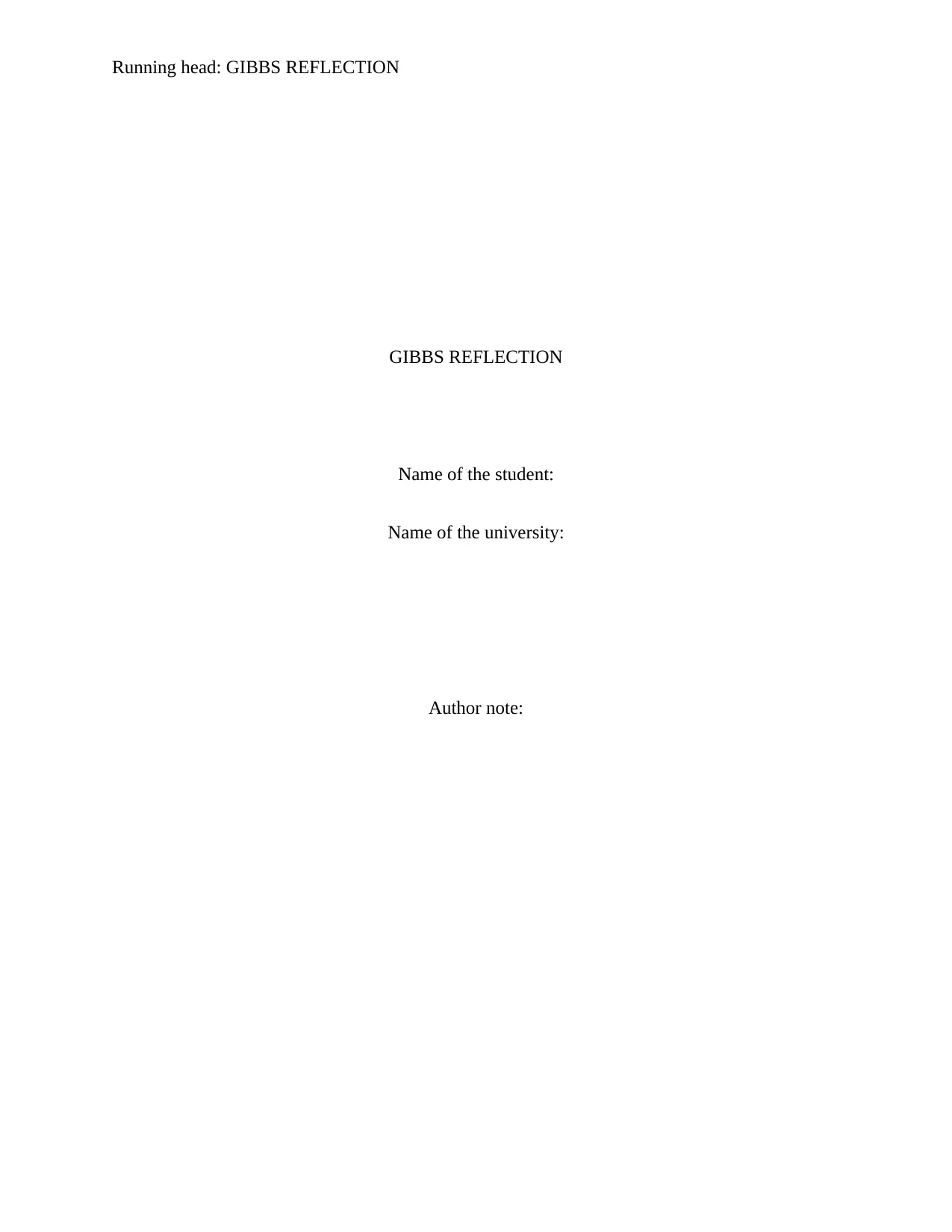
Running head: GIBBS REFLECTION
GIBBS REFLECTION
Name of the student:
Name of the university:
Author note:
GIBBS REFLECTION
Name of the student:
Name of the university:
Author note:
Secure Best Marks with AI Grader
Need help grading? Try our AI Grader for instant feedback on your assignments.
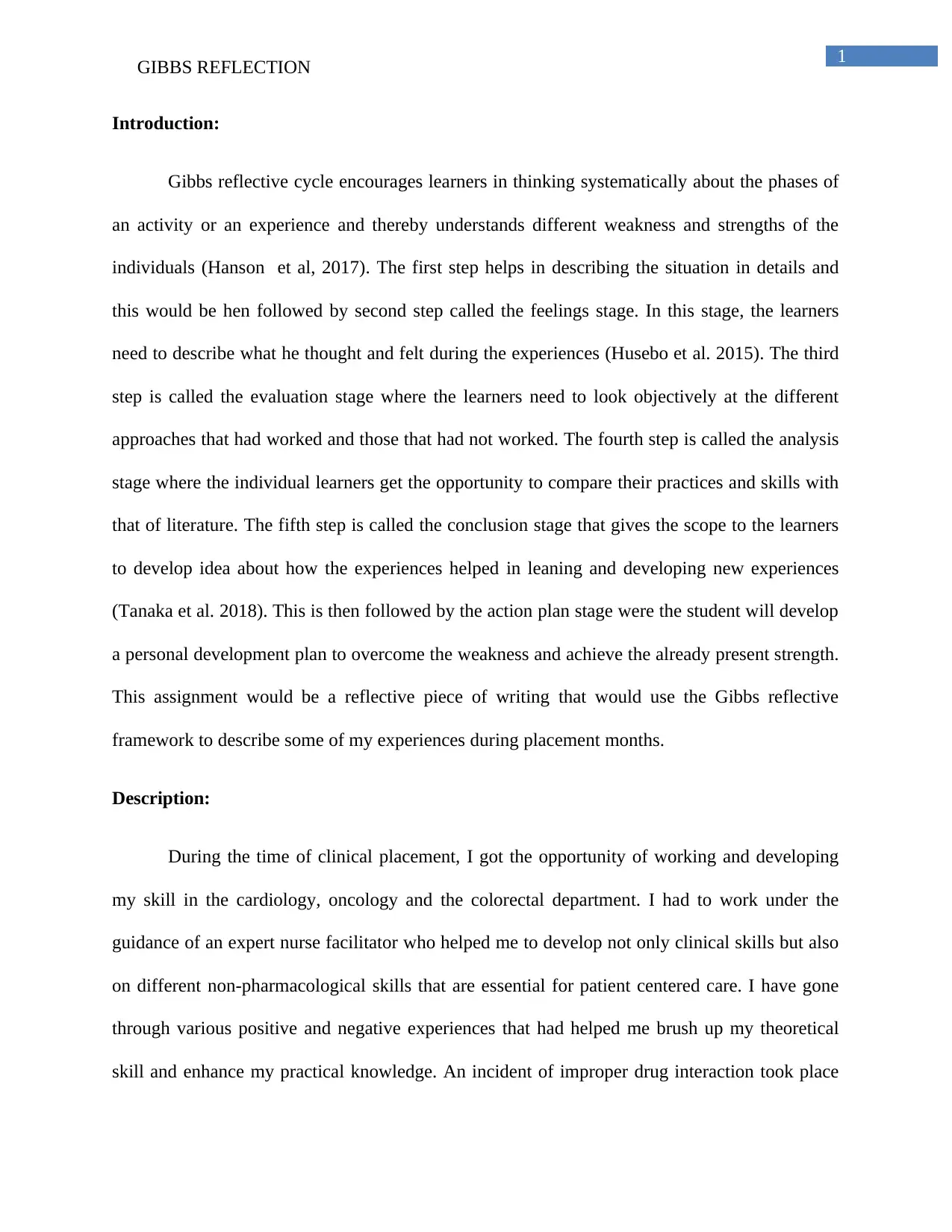
1
GIBBS REFLECTION
Introduction:
Gibbs reflective cycle encourages learners in thinking systematically about the phases of
an activity or an experience and thereby understands different weakness and strengths of the
individuals (Hanson et al, 2017). The first step helps in describing the situation in details and
this would be hen followed by second step called the feelings stage. In this stage, the learners
need to describe what he thought and felt during the experiences (Husebo et al. 2015). The third
step is called the evaluation stage where the learners need to look objectively at the different
approaches that had worked and those that had not worked. The fourth step is called the analysis
stage where the individual learners get the opportunity to compare their practices and skills with
that of literature. The fifth step is called the conclusion stage that gives the scope to the learners
to develop idea about how the experiences helped in leaning and developing new experiences
(Tanaka et al. 2018). This is then followed by the action plan stage were the student will develop
a personal development plan to overcome the weakness and achieve the already present strength.
This assignment would be a reflective piece of writing that would use the Gibbs reflective
framework to describe some of my experiences during placement months.
Description:
During the time of clinical placement, I got the opportunity of working and developing
my skill in the cardiology, oncology and the colorectal department. I had to work under the
guidance of an expert nurse facilitator who helped me to develop not only clinical skills but also
on different non-pharmacological skills that are essential for patient centered care. I have gone
through various positive and negative experiences that had helped me brush up my theoretical
skill and enhance my practical knowledge. An incident of improper drug interaction took place
GIBBS REFLECTION
Introduction:
Gibbs reflective cycle encourages learners in thinking systematically about the phases of
an activity or an experience and thereby understands different weakness and strengths of the
individuals (Hanson et al, 2017). The first step helps in describing the situation in details and
this would be hen followed by second step called the feelings stage. In this stage, the learners
need to describe what he thought and felt during the experiences (Husebo et al. 2015). The third
step is called the evaluation stage where the learners need to look objectively at the different
approaches that had worked and those that had not worked. The fourth step is called the analysis
stage where the individual learners get the opportunity to compare their practices and skills with
that of literature. The fifth step is called the conclusion stage that gives the scope to the learners
to develop idea about how the experiences helped in leaning and developing new experiences
(Tanaka et al. 2018). This is then followed by the action plan stage were the student will develop
a personal development plan to overcome the weakness and achieve the already present strength.
This assignment would be a reflective piece of writing that would use the Gibbs reflective
framework to describe some of my experiences during placement months.
Description:
During the time of clinical placement, I got the opportunity of working and developing
my skill in the cardiology, oncology and the colorectal department. I had to work under the
guidance of an expert nurse facilitator who helped me to develop not only clinical skills but also
on different non-pharmacological skills that are essential for patient centered care. I have gone
through various positive and negative experiences that had helped me brush up my theoretical
skill and enhance my practical knowledge. An incident of improper drug interaction took place
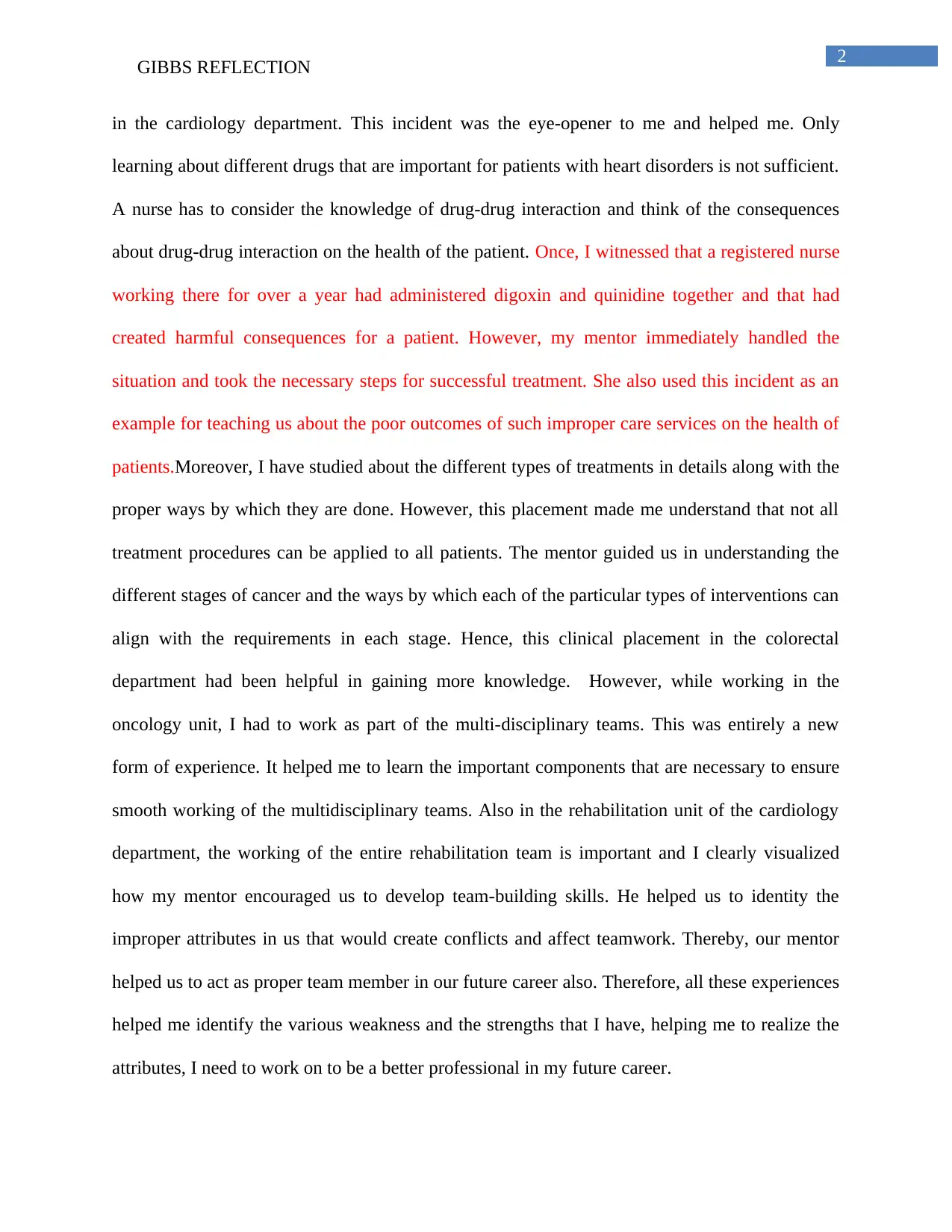
2
GIBBS REFLECTION
in the cardiology department. This incident was the eye-opener to me and helped me. Only
learning about different drugs that are important for patients with heart disorders is not sufficient.
A nurse has to consider the knowledge of drug-drug interaction and think of the consequences
about drug-drug interaction on the health of the patient. Once, I witnessed that a registered nurse
working there for over a year had administered digoxin and quinidine together and that had
created harmful consequences for a patient. However, my mentor immediately handled the
situation and took the necessary steps for successful treatment. She also used this incident as an
example for teaching us about the poor outcomes of such improper care services on the health of
patients.Moreover, I have studied about the different types of treatments in details along with the
proper ways by which they are done. However, this placement made me understand that not all
treatment procedures can be applied to all patients. The mentor guided us in understanding the
different stages of cancer and the ways by which each of the particular types of interventions can
align with the requirements in each stage. Hence, this clinical placement in the colorectal
department had been helpful in gaining more knowledge. However, while working in the
oncology unit, I had to work as part of the multi-disciplinary teams. This was entirely a new
form of experience. It helped me to learn the important components that are necessary to ensure
smooth working of the multidisciplinary teams. Also in the rehabilitation unit of the cardiology
department, the working of the entire rehabilitation team is important and I clearly visualized
how my mentor encouraged us to develop team-building skills. He helped us to identity the
improper attributes in us that would create conflicts and affect teamwork. Thereby, our mentor
helped us to act as proper team member in our future career also. Therefore, all these experiences
helped me identify the various weakness and the strengths that I have, helping me to realize the
attributes, I need to work on to be a better professional in my future career.
GIBBS REFLECTION
in the cardiology department. This incident was the eye-opener to me and helped me. Only
learning about different drugs that are important for patients with heart disorders is not sufficient.
A nurse has to consider the knowledge of drug-drug interaction and think of the consequences
about drug-drug interaction on the health of the patient. Once, I witnessed that a registered nurse
working there for over a year had administered digoxin and quinidine together and that had
created harmful consequences for a patient. However, my mentor immediately handled the
situation and took the necessary steps for successful treatment. She also used this incident as an
example for teaching us about the poor outcomes of such improper care services on the health of
patients.Moreover, I have studied about the different types of treatments in details along with the
proper ways by which they are done. However, this placement made me understand that not all
treatment procedures can be applied to all patients. The mentor guided us in understanding the
different stages of cancer and the ways by which each of the particular types of interventions can
align with the requirements in each stage. Hence, this clinical placement in the colorectal
department had been helpful in gaining more knowledge. However, while working in the
oncology unit, I had to work as part of the multi-disciplinary teams. This was entirely a new
form of experience. It helped me to learn the important components that are necessary to ensure
smooth working of the multidisciplinary teams. Also in the rehabilitation unit of the cardiology
department, the working of the entire rehabilitation team is important and I clearly visualized
how my mentor encouraged us to develop team-building skills. He helped us to identity the
improper attributes in us that would create conflicts and affect teamwork. Thereby, our mentor
helped us to act as proper team member in our future career also. Therefore, all these experiences
helped me identify the various weakness and the strengths that I have, helping me to realize the
attributes, I need to work on to be a better professional in my future career.
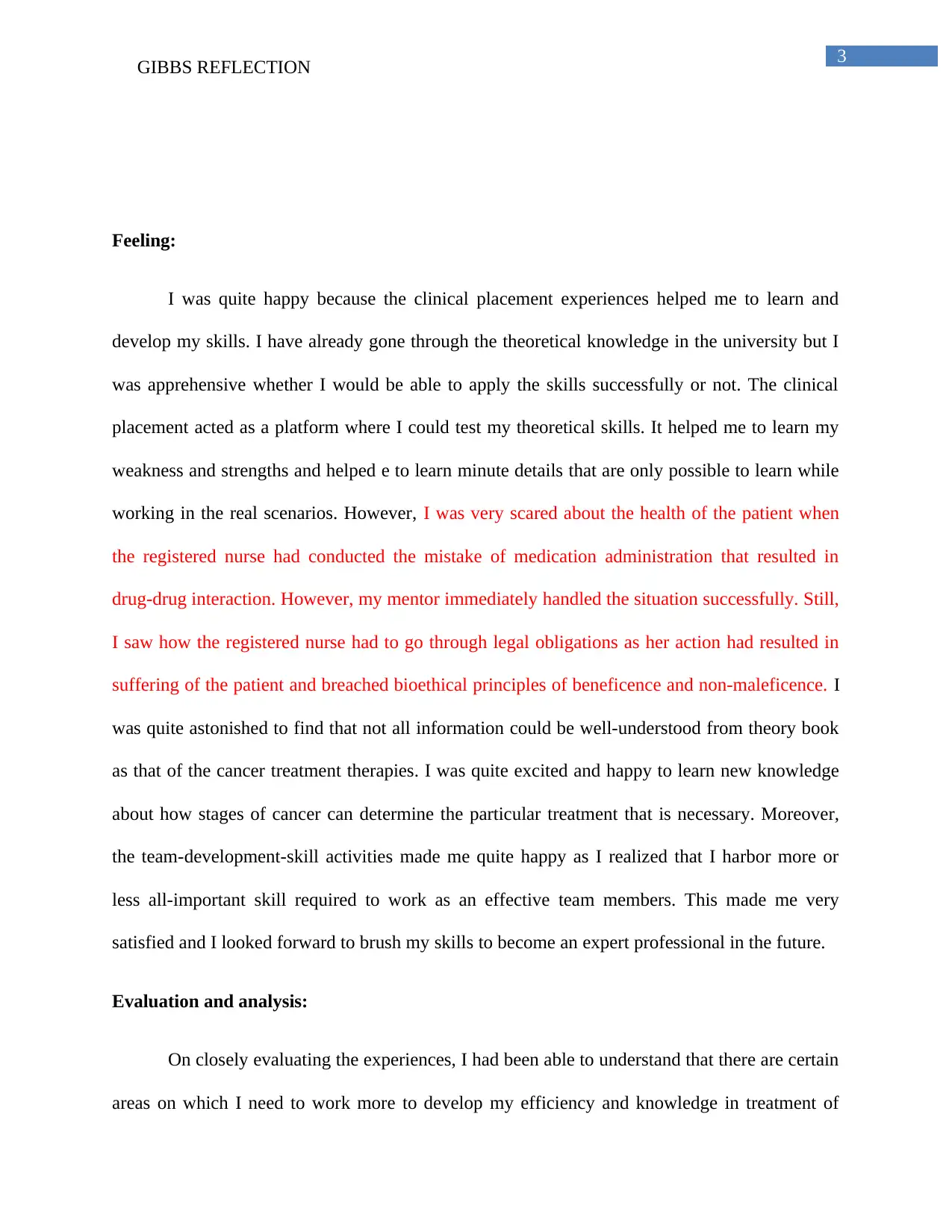
3
GIBBS REFLECTION
Feeling:
I was quite happy because the clinical placement experiences helped me to learn and
develop my skills. I have already gone through the theoretical knowledge in the university but I
was apprehensive whether I would be able to apply the skills successfully or not. The clinical
placement acted as a platform where I could test my theoretical skills. It helped me to learn my
weakness and strengths and helped e to learn minute details that are only possible to learn while
working in the real scenarios. However, I was very scared about the health of the patient when
the registered nurse had conducted the mistake of medication administration that resulted in
drug-drug interaction. However, my mentor immediately handled the situation successfully. Still,
I saw how the registered nurse had to go through legal obligations as her action had resulted in
suffering of the patient and breached bioethical principles of beneficence and non-maleficence. I
was quite astonished to find that not all information could be well-understood from theory book
as that of the cancer treatment therapies. I was quite excited and happy to learn new knowledge
about how stages of cancer can determine the particular treatment that is necessary. Moreover,
the team-development-skill activities made me quite happy as I realized that I harbor more or
less all-important skill required to work as an effective team members. This made me very
satisfied and I looked forward to brush my skills to become an expert professional in the future.
Evaluation and analysis:
On closely evaluating the experiences, I had been able to understand that there are certain
areas on which I need to work more to develop my efficiency and knowledge in treatment of
GIBBS REFLECTION
Feeling:
I was quite happy because the clinical placement experiences helped me to learn and
develop my skills. I have already gone through the theoretical knowledge in the university but I
was apprehensive whether I would be able to apply the skills successfully or not. The clinical
placement acted as a platform where I could test my theoretical skills. It helped me to learn my
weakness and strengths and helped e to learn minute details that are only possible to learn while
working in the real scenarios. However, I was very scared about the health of the patient when
the registered nurse had conducted the mistake of medication administration that resulted in
drug-drug interaction. However, my mentor immediately handled the situation successfully. Still,
I saw how the registered nurse had to go through legal obligations as her action had resulted in
suffering of the patient and breached bioethical principles of beneficence and non-maleficence. I
was quite astonished to find that not all information could be well-understood from theory book
as that of the cancer treatment therapies. I was quite excited and happy to learn new knowledge
about how stages of cancer can determine the particular treatment that is necessary. Moreover,
the team-development-skill activities made me quite happy as I realized that I harbor more or
less all-important skill required to work as an effective team members. This made me very
satisfied and I looked forward to brush my skills to become an expert professional in the future.
Evaluation and analysis:
On closely evaluating the experiences, I had been able to understand that there are certain
areas on which I need to work more to develop my efficiency and knowledge in treatment of
Secure Best Marks with AI Grader
Need help grading? Try our AI Grader for instant feedback on your assignments.
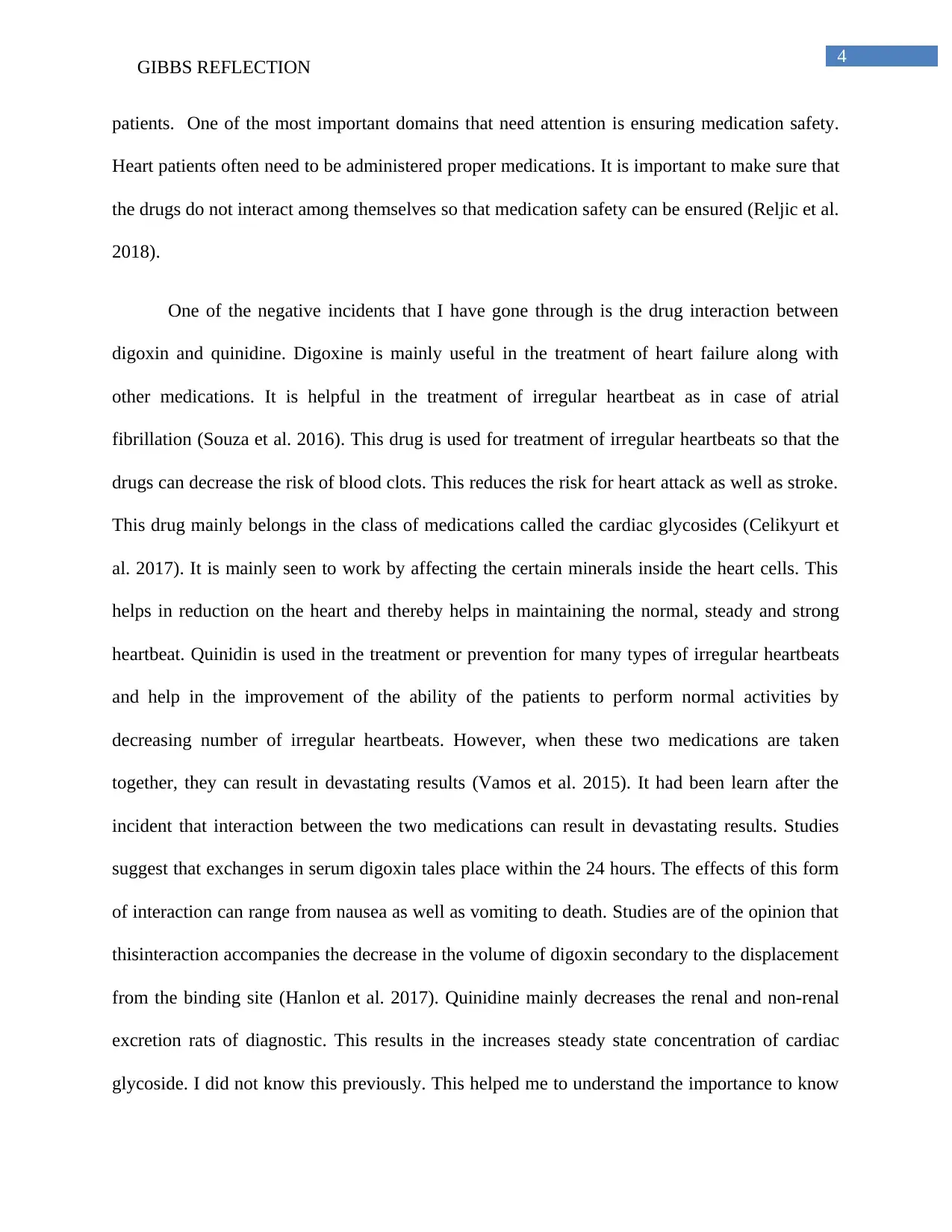
4
GIBBS REFLECTION
patients. One of the most important domains that need attention is ensuring medication safety.
Heart patients often need to be administered proper medications. It is important to make sure that
the drugs do not interact among themselves so that medication safety can be ensured (Reljic et al.
2018).
One of the negative incidents that I have gone through is the drug interaction between
digoxin and quinidine. Digoxine is mainly useful in the treatment of heart failure along with
other medications. It is helpful in the treatment of irregular heartbeat as in case of atrial
fibrillation (Souza et al. 2016). This drug is used for treatment of irregular heartbeats so that the
drugs can decrease the risk of blood clots. This reduces the risk for heart attack as well as stroke.
This drug mainly belongs in the class of medications called the cardiac glycosides (Celikyurt et
al. 2017). It is mainly seen to work by affecting the certain minerals inside the heart cells. This
helps in reduction on the heart and thereby helps in maintaining the normal, steady and strong
heartbeat. Quinidin is used in the treatment or prevention for many types of irregular heartbeats
and help in the improvement of the ability of the patients to perform normal activities by
decreasing number of irregular heartbeats. However, when these two medications are taken
together, they can result in devastating results (Vamos et al. 2015). It had been learn after the
incident that interaction between the two medications can result in devastating results. Studies
suggest that exchanges in serum digoxin tales place within the 24 hours. The effects of this form
of interaction can range from nausea as well as vomiting to death. Studies are of the opinion that
thisinteraction accompanies the decrease in the volume of digoxin secondary to the displacement
from the binding site (Hanlon et al. 2017). Quinidine mainly decreases the renal and non-renal
excretion rats of diagnostic. This results in the increases steady state concentration of cardiac
glycoside. I did not know this previously. This helped me to understand the importance to know
GIBBS REFLECTION
patients. One of the most important domains that need attention is ensuring medication safety.
Heart patients often need to be administered proper medications. It is important to make sure that
the drugs do not interact among themselves so that medication safety can be ensured (Reljic et al.
2018).
One of the negative incidents that I have gone through is the drug interaction between
digoxin and quinidine. Digoxine is mainly useful in the treatment of heart failure along with
other medications. It is helpful in the treatment of irregular heartbeat as in case of atrial
fibrillation (Souza et al. 2016). This drug is used for treatment of irregular heartbeats so that the
drugs can decrease the risk of blood clots. This reduces the risk for heart attack as well as stroke.
This drug mainly belongs in the class of medications called the cardiac glycosides (Celikyurt et
al. 2017). It is mainly seen to work by affecting the certain minerals inside the heart cells. This
helps in reduction on the heart and thereby helps in maintaining the normal, steady and strong
heartbeat. Quinidin is used in the treatment or prevention for many types of irregular heartbeats
and help in the improvement of the ability of the patients to perform normal activities by
decreasing number of irregular heartbeats. However, when these two medications are taken
together, they can result in devastating results (Vamos et al. 2015). It had been learn after the
incident that interaction between the two medications can result in devastating results. Studies
suggest that exchanges in serum digoxin tales place within the 24 hours. The effects of this form
of interaction can range from nausea as well as vomiting to death. Studies are of the opinion that
thisinteraction accompanies the decrease in the volume of digoxin secondary to the displacement
from the binding site (Hanlon et al. 2017). Quinidine mainly decreases the renal and non-renal
excretion rats of diagnostic. This results in the increases steady state concentration of cardiac
glycoside. I did not know this previously. This helped me to understand the importance to know
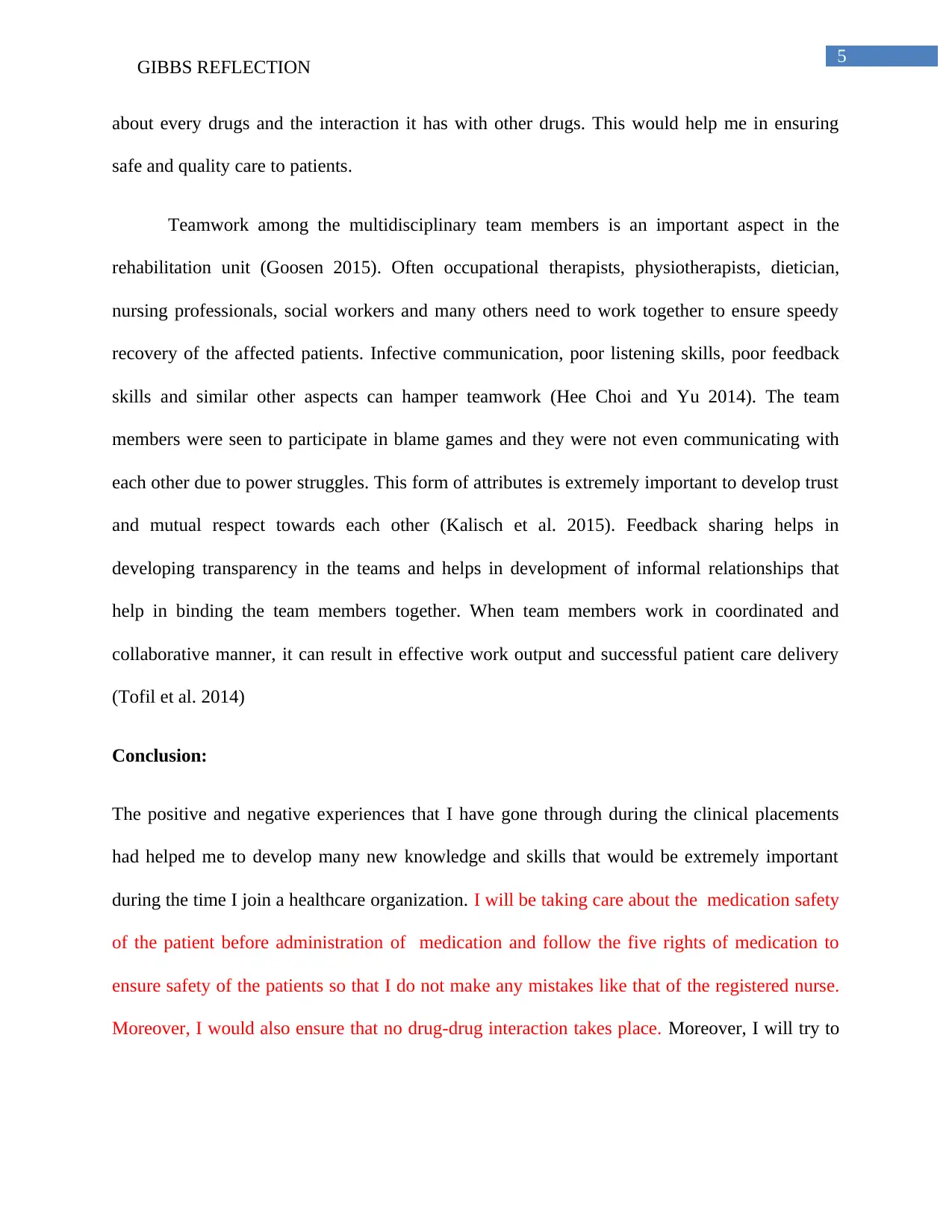
5
GIBBS REFLECTION
about every drugs and the interaction it has with other drugs. This would help me in ensuring
safe and quality care to patients.
Teamwork among the multidisciplinary team members is an important aspect in the
rehabilitation unit (Goosen 2015). Often occupational therapists, physiotherapists, dietician,
nursing professionals, social workers and many others need to work together to ensure speedy
recovery of the affected patients. Infective communication, poor listening skills, poor feedback
skills and similar other aspects can hamper teamwork (Hee Choi and Yu 2014). The team
members were seen to participate in blame games and they were not even communicating with
each other due to power struggles. This form of attributes is extremely important to develop trust
and mutual respect towards each other (Kalisch et al. 2015). Feedback sharing helps in
developing transparency in the teams and helps in development of informal relationships that
help in binding the team members together. When team members work in coordinated and
collaborative manner, it can result in effective work output and successful patient care delivery
(Tofil et al. 2014)
Conclusion:
The positive and negative experiences that I have gone through during the clinical placements
had helped me to develop many new knowledge and skills that would be extremely important
during the time I join a healthcare organization. I will be taking care about the medication safety
of the patient before administration of medication and follow the five rights of medication to
ensure safety of the patients so that I do not make any mistakes like that of the registered nurse.
Moreover, I would also ensure that no drug-drug interaction takes place. Moreover, I will try to
GIBBS REFLECTION
about every drugs and the interaction it has with other drugs. This would help me in ensuring
safe and quality care to patients.
Teamwork among the multidisciplinary team members is an important aspect in the
rehabilitation unit (Goosen 2015). Often occupational therapists, physiotherapists, dietician,
nursing professionals, social workers and many others need to work together to ensure speedy
recovery of the affected patients. Infective communication, poor listening skills, poor feedback
skills and similar other aspects can hamper teamwork (Hee Choi and Yu 2014). The team
members were seen to participate in blame games and they were not even communicating with
each other due to power struggles. This form of attributes is extremely important to develop trust
and mutual respect towards each other (Kalisch et al. 2015). Feedback sharing helps in
developing transparency in the teams and helps in development of informal relationships that
help in binding the team members together. When team members work in coordinated and
collaborative manner, it can result in effective work output and successful patient care delivery
(Tofil et al. 2014)
Conclusion:
The positive and negative experiences that I have gone through during the clinical placements
had helped me to develop many new knowledge and skills that would be extremely important
during the time I join a healthcare organization. I will be taking care about the medication safety
of the patient before administration of medication and follow the five rights of medication to
ensure safety of the patients so that I do not make any mistakes like that of the registered nurse.
Moreover, I would also ensure that no drug-drug interaction takes place. Moreover, I will try to
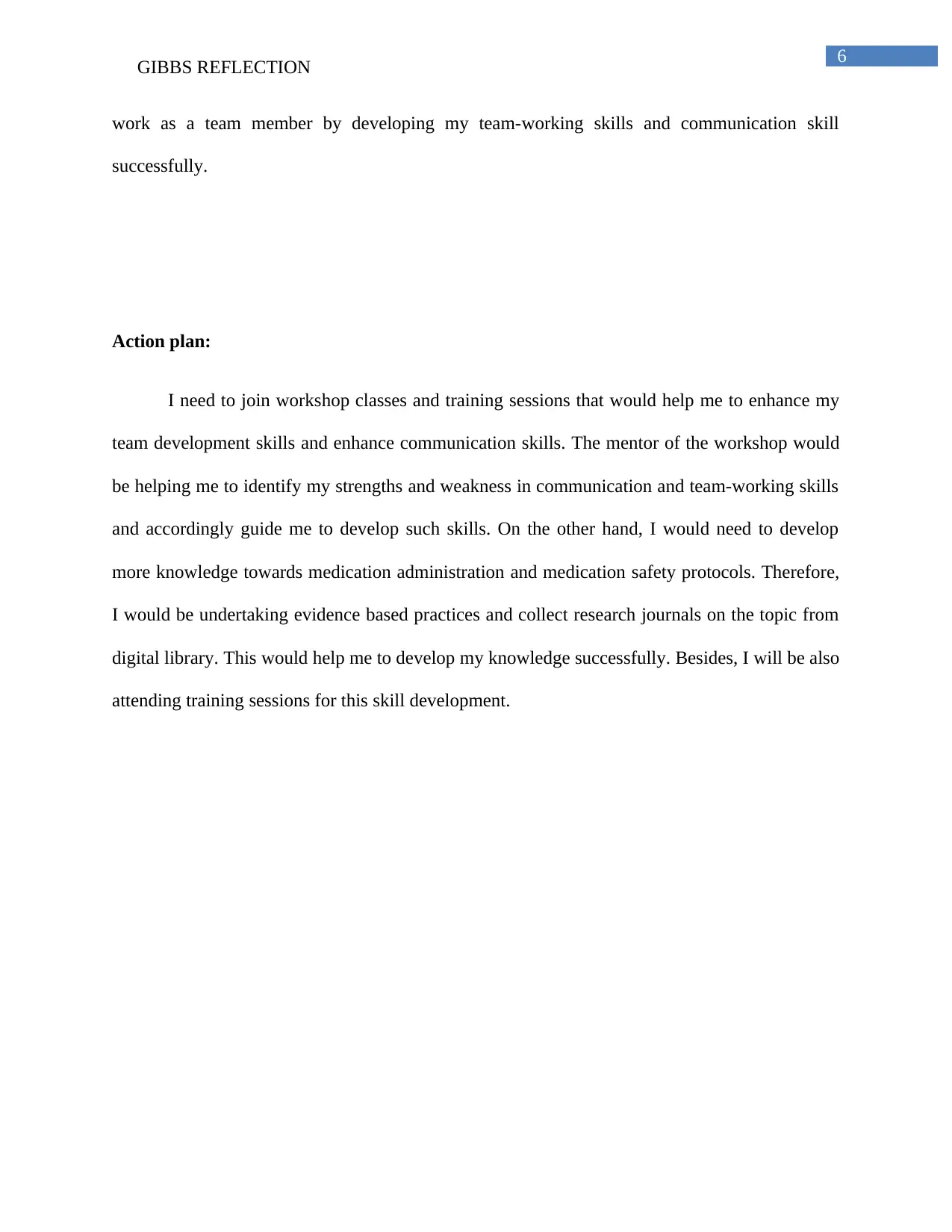
6
GIBBS REFLECTION
work as a team member by developing my team-working skills and communication skill
successfully.
Action plan:
I need to join workshop classes and training sessions that would help me to enhance my
team development skills and enhance communication skills. The mentor of the workshop would
be helping me to identify my strengths and weakness in communication and team-working skills
and accordingly guide me to develop such skills. On the other hand, I would need to develop
more knowledge towards medication administration and medication safety protocols. Therefore,
I would be undertaking evidence based practices and collect research journals on the topic from
digital library. This would help me to develop my knowledge successfully. Besides, I will be also
attending training sessions for this skill development.
GIBBS REFLECTION
work as a team member by developing my team-working skills and communication skill
successfully.
Action plan:
I need to join workshop classes and training sessions that would help me to enhance my
team development skills and enhance communication skills. The mentor of the workshop would
be helping me to identify my strengths and weakness in communication and team-working skills
and accordingly guide me to develop such skills. On the other hand, I would need to develop
more knowledge towards medication administration and medication safety protocols. Therefore,
I would be undertaking evidence based practices and collect research journals on the topic from
digital library. This would help me to develop my knowledge successfully. Besides, I will be also
attending training sessions for this skill development.
Paraphrase This Document
Need a fresh take? Get an instant paraphrase of this document with our AI Paraphraser
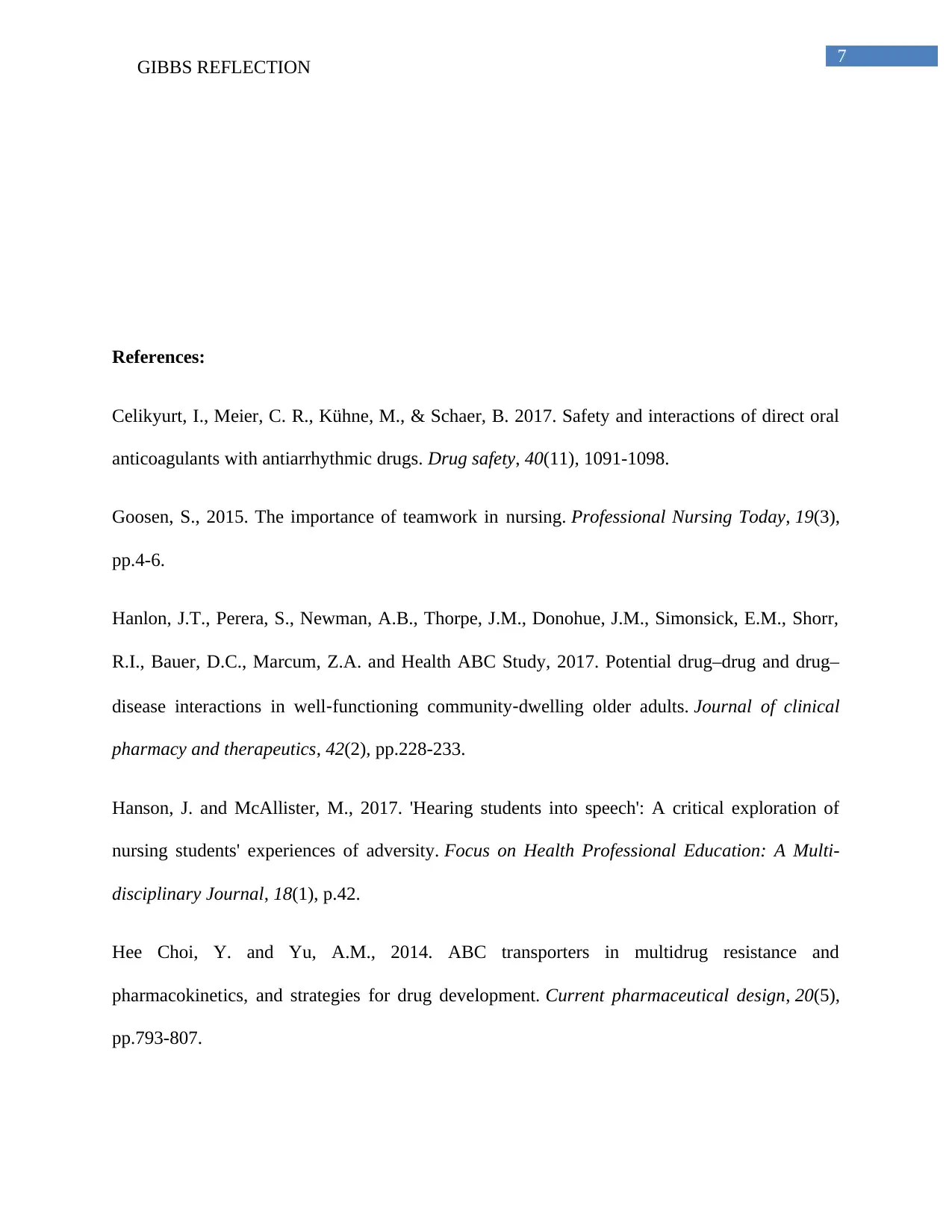
7
GIBBS REFLECTION
References:
Celikyurt, I., Meier, C. R., Kühne, M., & Schaer, B. 2017. Safety and interactions of direct oral
anticoagulants with antiarrhythmic drugs. Drug safety, 40(11), 1091-1098.
Goosen, S., 2015. The importance of teamwork in nursing. Professional Nursing Today, 19(3),
pp.4-6.
Hanlon, J.T., Perera, S., Newman, A.B., Thorpe, J.M., Donohue, J.M., Simonsick, E.M., Shorr,
R.I., Bauer, D.C., Marcum, Z.A. and Health ABC Study, 2017. Potential drug–drug and drug–
disease interactions in well‐functioning community‐dwelling older adults. Journal of clinical
pharmacy and therapeutics, 42(2), pp.228-233.
Hanson, J. and McAllister, M., 2017. 'Hearing students into speech': A critical exploration of
nursing students' experiences of adversity. Focus on Health Professional Education: A Multi-
disciplinary Journal, 18(1), p.42.
Hee Choi, Y. and Yu, A.M., 2014. ABC transporters in multidrug resistance and
pharmacokinetics, and strategies for drug development. Current pharmaceutical design, 20(5),
pp.793-807.
GIBBS REFLECTION
References:
Celikyurt, I., Meier, C. R., Kühne, M., & Schaer, B. 2017. Safety and interactions of direct oral
anticoagulants with antiarrhythmic drugs. Drug safety, 40(11), 1091-1098.
Goosen, S., 2015. The importance of teamwork in nursing. Professional Nursing Today, 19(3),
pp.4-6.
Hanlon, J.T., Perera, S., Newman, A.B., Thorpe, J.M., Donohue, J.M., Simonsick, E.M., Shorr,
R.I., Bauer, D.C., Marcum, Z.A. and Health ABC Study, 2017. Potential drug–drug and drug–
disease interactions in well‐functioning community‐dwelling older adults. Journal of clinical
pharmacy and therapeutics, 42(2), pp.228-233.
Hanson, J. and McAllister, M., 2017. 'Hearing students into speech': A critical exploration of
nursing students' experiences of adversity. Focus on Health Professional Education: A Multi-
disciplinary Journal, 18(1), p.42.
Hee Choi, Y. and Yu, A.M., 2014. ABC transporters in multidrug resistance and
pharmacokinetics, and strategies for drug development. Current pharmaceutical design, 20(5),
pp.793-807.
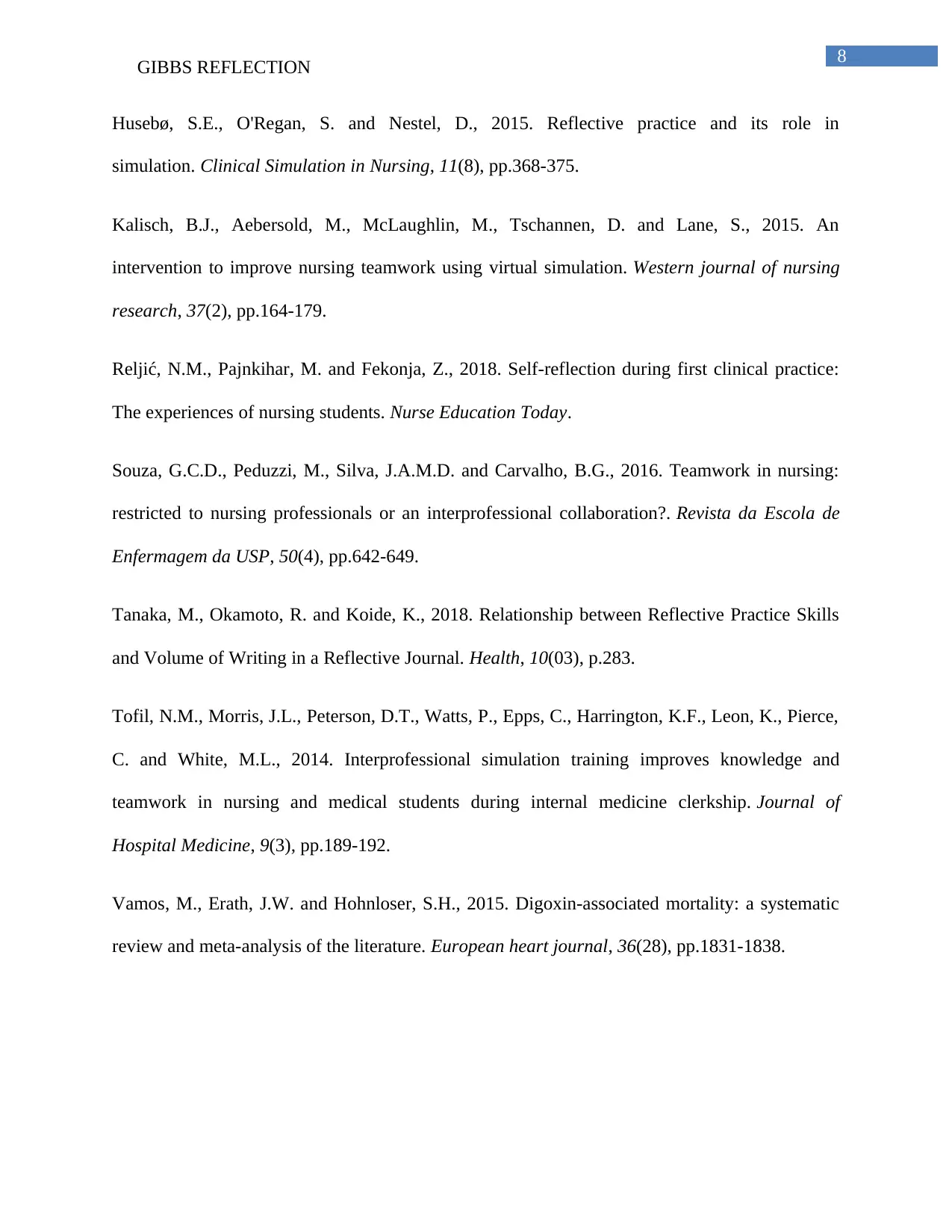
8
GIBBS REFLECTION
Husebø, S.E., O'Regan, S. and Nestel, D., 2015. Reflective practice and its role in
simulation. Clinical Simulation in Nursing, 11(8), pp.368-375.
Kalisch, B.J., Aebersold, M., McLaughlin, M., Tschannen, D. and Lane, S., 2015. An
intervention to improve nursing teamwork using virtual simulation. Western journal of nursing
research, 37(2), pp.164-179.
Reljić, N.M., Pajnkihar, M. and Fekonja, Z., 2018. Self-reflection during first clinical practice:
The experiences of nursing students. Nurse Education Today.
Souza, G.C.D., Peduzzi, M., Silva, J.A.M.D. and Carvalho, B.G., 2016. Teamwork in nursing:
restricted to nursing professionals or an interprofessional collaboration?. Revista da Escola de
Enfermagem da USP, 50(4), pp.642-649.
Tanaka, M., Okamoto, R. and Koide, K., 2018. Relationship between Reflective Practice Skills
and Volume of Writing in a Reflective Journal. Health, 10(03), p.283.
Tofil, N.M., Morris, J.L., Peterson, D.T., Watts, P., Epps, C., Harrington, K.F., Leon, K., Pierce,
C. and White, M.L., 2014. Interprofessional simulation training improves knowledge and
teamwork in nursing and medical students during internal medicine clerkship. Journal of
Hospital Medicine, 9(3), pp.189-192.
Vamos, M., Erath, J.W. and Hohnloser, S.H., 2015. Digoxin-associated mortality: a systematic
review and meta-analysis of the literature. European heart journal, 36(28), pp.1831-1838.
GIBBS REFLECTION
Husebø, S.E., O'Regan, S. and Nestel, D., 2015. Reflective practice and its role in
simulation. Clinical Simulation in Nursing, 11(8), pp.368-375.
Kalisch, B.J., Aebersold, M., McLaughlin, M., Tschannen, D. and Lane, S., 2015. An
intervention to improve nursing teamwork using virtual simulation. Western journal of nursing
research, 37(2), pp.164-179.
Reljić, N.M., Pajnkihar, M. and Fekonja, Z., 2018. Self-reflection during first clinical practice:
The experiences of nursing students. Nurse Education Today.
Souza, G.C.D., Peduzzi, M., Silva, J.A.M.D. and Carvalho, B.G., 2016. Teamwork in nursing:
restricted to nursing professionals or an interprofessional collaboration?. Revista da Escola de
Enfermagem da USP, 50(4), pp.642-649.
Tanaka, M., Okamoto, R. and Koide, K., 2018. Relationship between Reflective Practice Skills
and Volume of Writing in a Reflective Journal. Health, 10(03), p.283.
Tofil, N.M., Morris, J.L., Peterson, D.T., Watts, P., Epps, C., Harrington, K.F., Leon, K., Pierce,
C. and White, M.L., 2014. Interprofessional simulation training improves knowledge and
teamwork in nursing and medical students during internal medicine clerkship. Journal of
Hospital Medicine, 9(3), pp.189-192.
Vamos, M., Erath, J.W. and Hohnloser, S.H., 2015. Digoxin-associated mortality: a systematic
review and meta-analysis of the literature. European heart journal, 36(28), pp.1831-1838.

9
GIBBS REFLECTION
GIBBS REFLECTION
1 out of 10
Related Documents
Your All-in-One AI-Powered Toolkit for Academic Success.
+13062052269
info@desklib.com
Available 24*7 on WhatsApp / Email
![[object Object]](/_next/static/media/star-bottom.7253800d.svg)
Unlock your academic potential
© 2024 | Zucol Services PVT LTD | All rights reserved.





